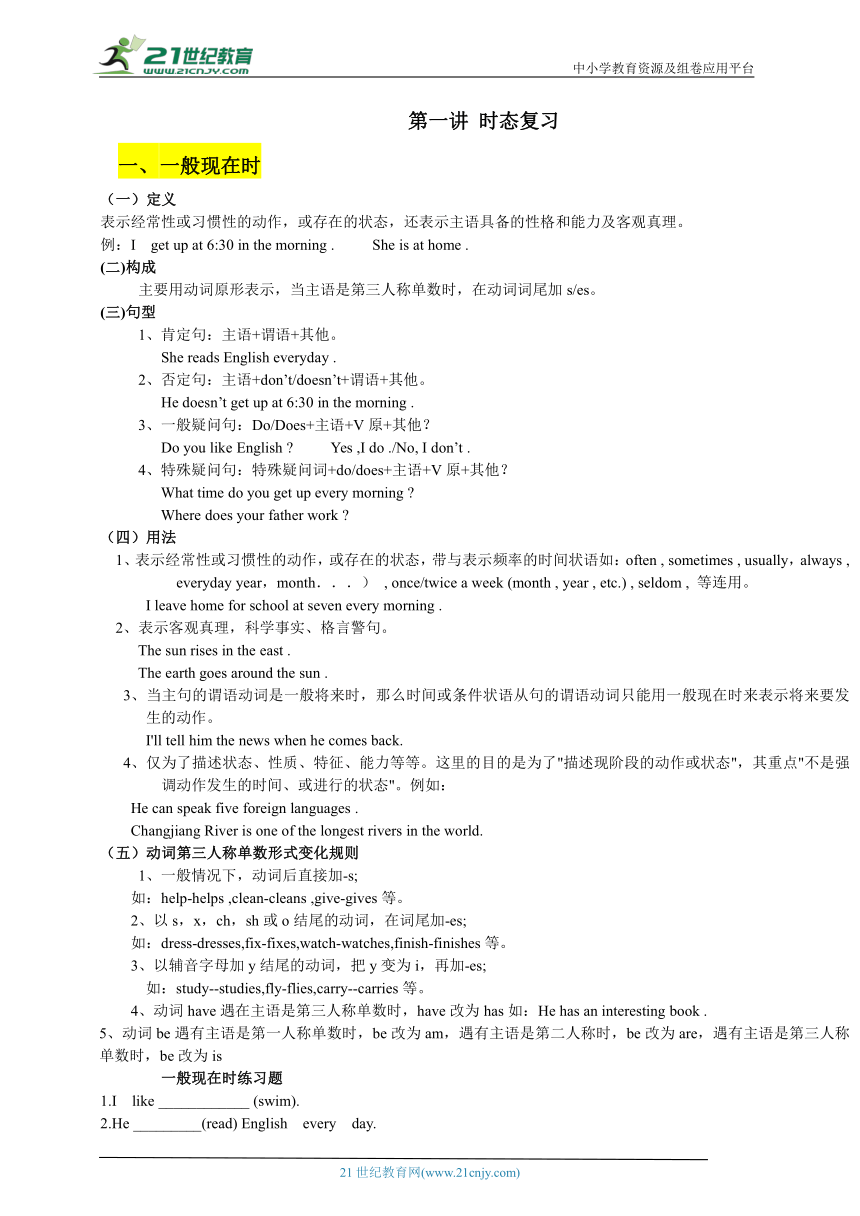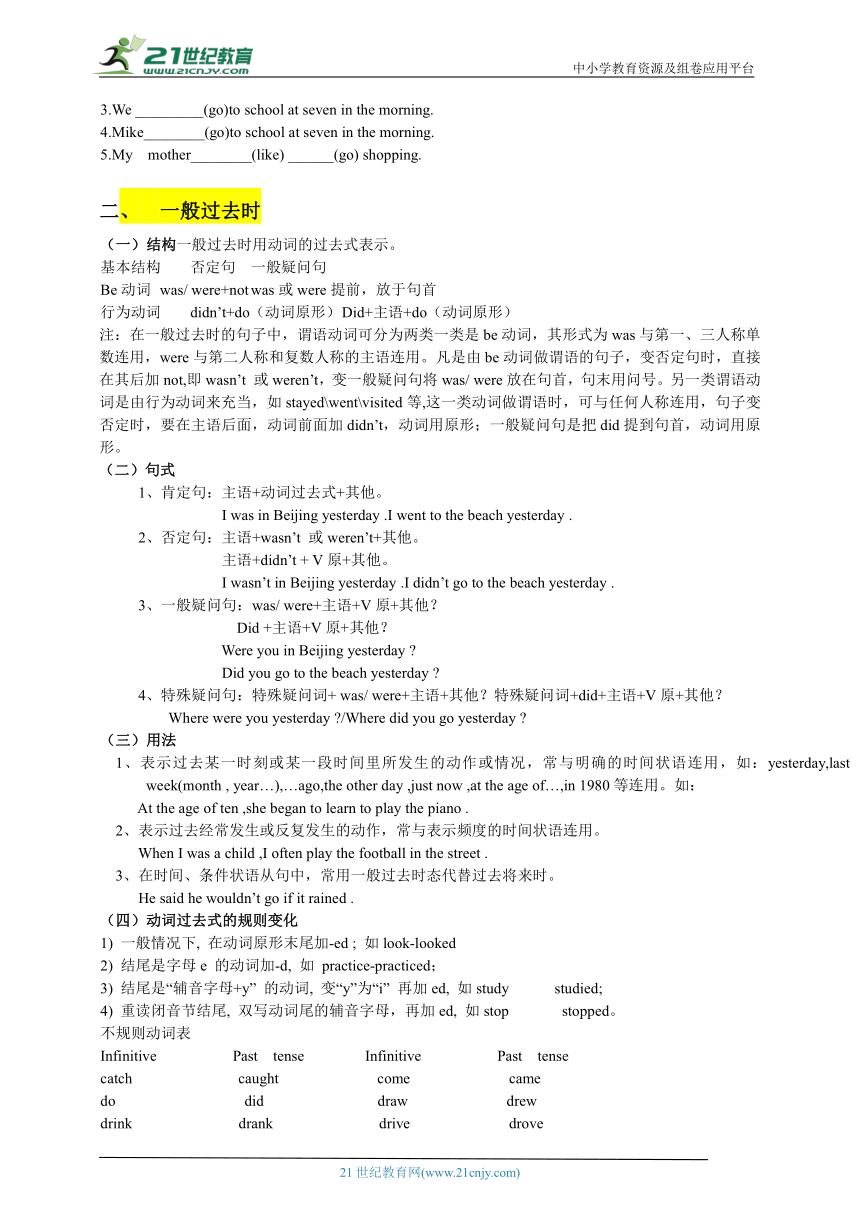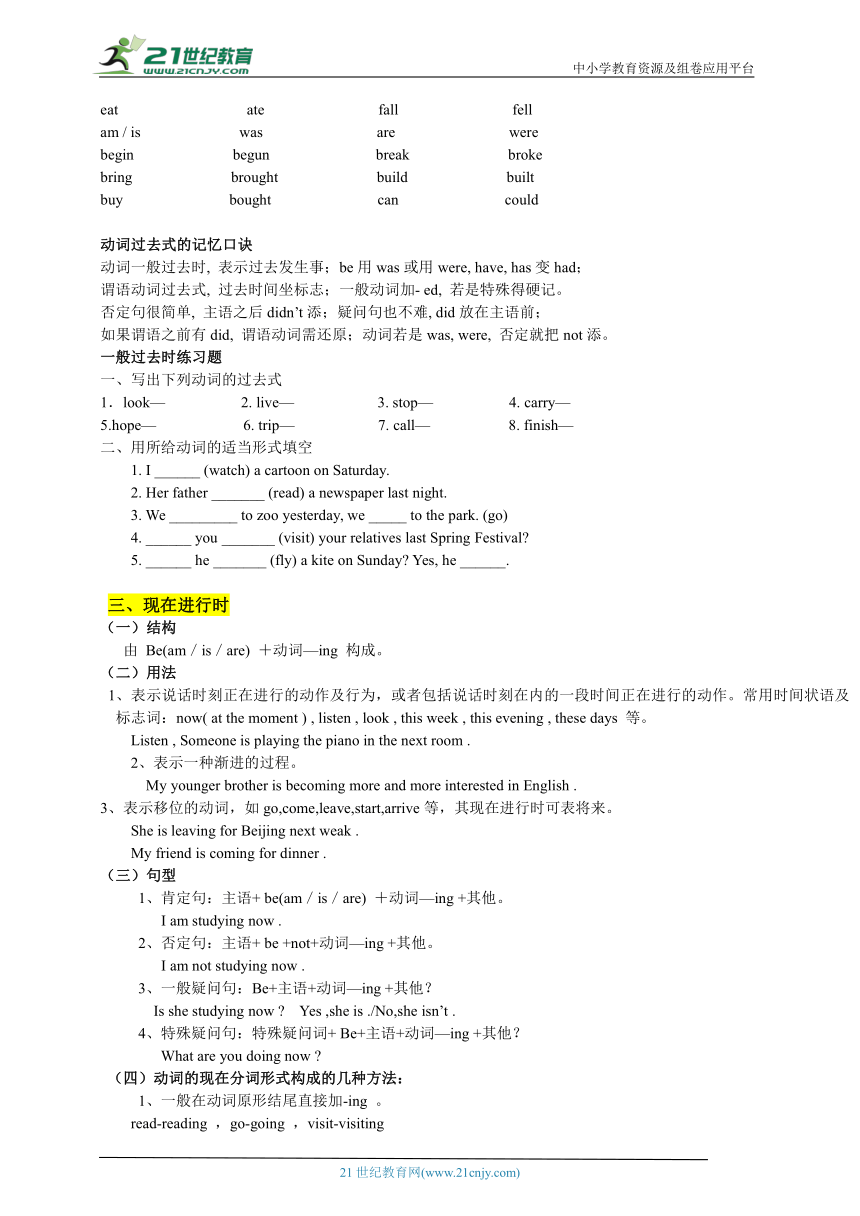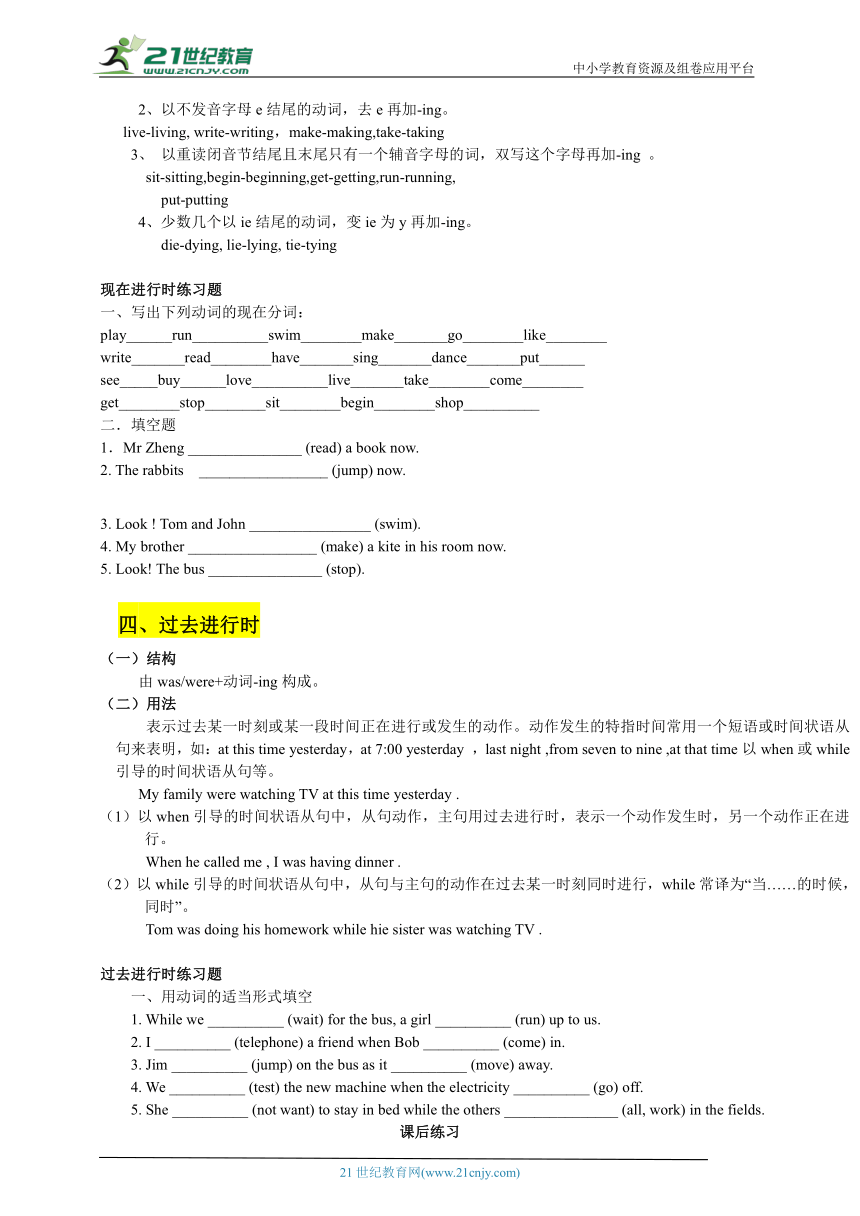【寒假学案】2024年人教版初二英语寒假教材 第一讲时态复习 (含答案)
文档属性
| 名称 | 【寒假学案】2024年人教版初二英语寒假教材 第一讲时态复习 (含答案) |  | |
| 格式 | doc | ||
| 文件大小 | 445.4KB | ||
| 资源类型 | 试卷 | ||
| 版本资源 | 人教新目标(Go for it)版 | ||
| 科目 | 英语 | ||
| 更新时间 | 2023-12-27 20:37:27 | ||
图片预览




文档简介
中小学教育资源及组卷应用平台
第一讲 时态复习
一、 一般现在时
(一)定义
表示经常性或习惯性的动作,或存在的状态,还表示主语具备的性格和能力及客观真理。
例:I get up at 6:30 in the morning . She is at home .
(二)构成
主要用动词原形表示,当主语是第三人称单数时,在动词词尾加s/es。
(三)句型
1、肯定句:主语+谓语+其他。
She reads English everyday .
2、否定句:主语+don’t/doesn’t+谓语+其他。
He doesn’t get up at 6:30 in the morning .
3、一般疑问句:Do/Does+主语+V原+其他?
Do you like English Yes ,I do ./No, I don’t .
4、特殊疑问句:特殊疑问词+do/does+主语+V原+其他?
What time do you get up every morning
Where does your father work
(四)用法
1、表示经常性或习惯性的动作,或存在的状态,带与表示频率的时间状语如:often , sometimes , usually,always , everyday year,month...) , once/twice a week (month , year , etc.) , seldom , 等连用。
I leave home for school at seven every morning .
2、表示客观真理,科学事实、格言警句。
The sun rises in the east .
The earth goes around the sun .
3、当主句的谓语动词是一般将来时,那么时间或条件状语从句的谓语动词只能用一般现在时来表示将来要发生的动作。
I'll tell him the news when he comes back.
4、仅为了描述状态、性质、特征、能力等等。这里的目的是为了"描述现阶段的动作或状态",其重点"不是强调动作发生的时间、或进行的状态"。例如:
He can speak five foreign languages .
Changjiang River is one of the longest rivers in the world.
(五)动词第三人称单数形式变化规则
1、一般情况下,动词后直接加-s;
如:help-helps ,clean-cleans ,give-gives等。
2、以s,x,ch,sh或o结尾的动词,在词尾加-es;
如:dress-dresses,fix-fixes,watch-watches,finish-finishes等。
3、以辅音字母加y结尾的动词,把y变为i,再加-es;
如:study--studies,fly-flies,carry--carries等。
4、动词have遇在主语是第三人称单数时,have改为has如:He has an interesting book .
5、动词be遇有主语是第一人称单数时,be改为am,遇有主语是第二人称时,be改为are,遇有主语是第三人称单数时,be改为is
一般现在时练习题
1.I like ____________ (swim).
2.He _________(read) English every day.
3.We _________(go)to school at seven in the morning.
4.Mike________(go)to school at seven in the morning.
5.My mother________(like) ______(go) shopping.
二、 一般过去时
(一)结构一般过去时用动词的过去式表示。
基本结构 否定句 一般疑问句
Be动词 was/ were+not was或were提前,放于句首
行为动词 didn’t+do(动词原形) Did+主语+do(动词原形)
注:在一般过去时的句子中,谓语动词可分为两类一类是be动词,其形式为was与第一、三人称单数连用,were与第二人称和复数人称的主语连用。凡是由be动词做谓语的句子,变否定句时,直接在其后加not,即wasn’t 或weren’t,变一般疑问句将was/ were放在句首,句末用问号。另一类谓语动词是由行为动词来充当,如stayed\went\visited等,这一类动词做谓语时,可与任何人称连用,句子变否定时,要在主语后面,动词前面加didn’t,动词用原形;一般疑问句是把did提到句首,动词用原形。
(二)句式
1、肯定句:主语+动词过去式+其他。
I was in Beijing yesterday .I went to the beach yesterday .
2、否定句:主语+wasn’t 或weren’t+其他。
主语+didn’t + V原+其他。
I wasn’t in Beijing yesterday .I didn’t go to the beach yesterday .
3、一般疑问句:was/ were+主语+V原+其他?
Did +主语+V原+其他?
Were you in Beijing yesterday
Did you go to the beach yesterday
4、特殊疑问句:特殊疑问词+ was/ were+主语+其他?特殊疑问词+did+主语+V原+其他?
Where were you yesterday /Where did you go yesterday
(三)用法
1、表示过去某一时刻或某一段时间里所发生的动作或情况,常与明确的时间状语连用,如:yesterday,last week(month , year…),…ago,the other day ,just now ,at the age of…,in 1980等连用。如:
At the age of ten ,she began to learn to play the piano .
2、表示过去经常发生或反复发生的动作,常与表示频度的时间状语连用。
When I was a child ,I often play the football in the street .
3、在时间、条件状语从句中,常用一般过去时态代替过去将来时。
He said he wouldn’t go if it rained .
(四)动词过去式的规则变化
1) 一般情况下, 在动词原形末尾加-ed ; 如look-looked
2) 结尾是字母e 的动词加-d, 如 practice-practiced;
3) 结尾是“辅音字母+y” 的动词, 变“y”为“i” 再加ed, 如study studied;
4) 重读闭音节结尾, 双写动词尾的辅音字母,再加ed, 如stop stopped。
不规则动词表
Infinitive Past tense Infinitive Past tense
catch caught come came
do did draw drew
drink drank drive drove
eat ate fall fell
am / is was are were
begin begun break broke
bring brought build built
buy bought can could
动词过去式的记忆口诀
动词一般过去时, 表示过去发生事;be用was或用were, have, has变had;
谓语动词过去式, 过去时间坐标志;一般动词加- ed, 若是特殊得硬记。
否定句很简单, 主语之后didn’t添;疑问句也不难, did放在主语前;
如果谓语之前有did, 谓语动词需还原;动词若是was, were, 否定就把not添。
一般过去时练习题
一、写出下列动词的过去式
1.look— 2. live— 3. stop— 4. carry—
5.hope— 6. trip— 7. call— 8. finish—
二、用所给动词的适当形式填空
1. I ______ (watch) a cartoon on Saturday.
2. Her father _______ (read) a newspaper last night.
3. We _________ to zoo yesterday, we _____ to the park. (go)
4. ______ you _______ (visit) your relatives last Spring Festival
5. ______ he _______ (fly) a kite on Sunday Yes, he ______.
三、现在进行时
(一)结构
由 Be(am/is/are) +动词—ing 构成。
(二)用法
1、表示说话时刻正在进行的动作及行为,或者包括说话时刻在内的一段时间正在进行的动作。常用时间状语及标志词:now( at the moment ) , listen , look , this week , this evening , these days 等。
Listen , Someone is playing the piano in the next room .
2、表示一种渐进的过程。
My younger brother is becoming more and more interested in English .
3、表示移位的动词,如go,come,leave,start,arrive等,其现在进行时可表将来。
She is leaving for Beijing next weak .
My friend is coming for dinner .
(三)句型
1、肯定句:主语+ be(am/is/are) +动词—ing +其他。
I am studying now .
2、否定句:主语+ be +not+动词—ing +其他。
I am not studying now .
3、一般疑问句:Be+主语+动词—ing +其他?
Is she studying now Yes ,she is ./No,she isn’t .
4、特殊疑问句:特殊疑问词+ Be+主语+动词—ing +其他?
What are you doing now
(四)动词的现在分词形式构成的几种方法:
1、一般在动词原形结尾直接加-ing 。
read-reading ,go-going ,visit-visiting
2、以不发音字母e结尾的动词,去e再加-ing。
live-living, write-writing,make-making,take-taking
3、 以重读闭音节结尾且末尾只有一个辅音字母的词,双写这个字母再加-ing 。
sit-sitting,begin-beginning,get-getting,run-running,
put-putting
4、少数几个以ie结尾的动词,变ie为y再加-ing。
die-dying, lie-lying, tie-tying
现在进行时练习题
一、写出下列动词的现在分词:
play______run__________swim________make_______go________like________
write_______read________have_______sing_______dance_______put______
see_____buy______love__________live_______take________come________
get________stop________sit________begin________shop__________
二.填空题
1.Mr Zheng _______________ (read) a book now.
2. The rabbits _________________ (jump) now.
3. Look ! Tom and John ________________ (swim).
4. My brother _________________ (make) a kite in his room now.
5. Look! The bus _______________ (stop).
四、过去进行时
(一)结构
由was/were+动词-ing构成。
(二)用法
表示过去某一时刻或某一段时间正在进行或发生的动作。动作发生的特指时间常用一个短语或时间状语从句来表明,如:at this time yesterday,at 7:00 yesterday ,last night ,from seven to nine ,at that time以when或while引导的时间状语从句等。
My family were watching TV at this time yesterday .
(1)以when引导的时间状语从句中,从句动作,主句用过去进行时,表示一个动作发生时,另一个动作正在进行。
When he called me , I was having dinner .
(2)以while引导的时间状语从句中,从句与主句的动作在过去某一时刻同时进行,while常译为“当……的时候,同时”。
Tom was doing his homework while hie sister was watching TV .
过去进行时练习题
一、用动词的适当形式填空
1. While we __________ (wait) for the bus, a girl __________ (run) up to us.
2. I __________ (telephone) a friend when Bob __________ (come) in.
3. Jim __________ (jump) on the bus as it __________ (move) away.
4. We __________ (test) the new machine when the electricity __________ (go) off.
5. She __________ (not want) to stay in bed while the others _______________ (all, work) in the fields.
课后练习
用所给动词的适当形式填空
We always ________ (go) to school on foot.
I ________ (have) an exciting party last weekend.
My mother ________ (buy)me a pair of new trousers tomorrow.
We __________ (watch) TV when suddenly the telephone rang.
He ___________ (teach) English here since we __________ (see) him 5 years ago.
—What ________ Tom ________ (do) yesterday evening
—He ________(watch) TV and ________ (read) an interesting book.
Tom, with his classmates, often ______ (play) football after school.
—Where is Jack
—On the playground. He _________ (play) football with his classmates.
I _________ (go) to see a film yesterday..
John ________ like his father. (look)
What ________ ( do ) he usually ________( do ) after school
Work hard, and you __________ (succeed).
Her mother _________ (cook) while her father was watching TV.
—_________ she _________(practice) her guitar now
—No, she _________ .
They all _________(go) to the mountains yesterday morning.
When the teacher came in, the students __________ (read) the text.
She says she __________(leave) soon.
Last term the children ____________ (learn) 1,000 English words.
We ___________(go) skating if it __________ (not rain) next Sunday.
Her mother __________ (become) a doctor in 2000.
He __________ (be) back in three hours.
Look at the dark clouds! It ________ (rain).
三、翻译句子(注明时态)
1.该吃晚饭了。
2.我叔叔今晚要来。
3.这本字典我已买了三年了。
4.安娜太小,还不能上学。
5.Jenny喜欢看书。昨晚她看了一本英语书。
6.他离开中国三年了。
7.暴风雨来临的时候你在做什么?
8.布莱克太太经常在英语上帮助我们。
9.昨晚这个时候我们正在谈论你呢。
10.太阳在东方升起在西方落下。
语篇补全 阅读下面短文,从短文后的选项中选出能填入空白处的最佳选项补全短文。选项中有一处为多余选项。
It’s difficult when a best friend isn’t around---maybe because you hate moved to a different school or a different class or you are ill at home. You may feel lonely without friends. You want to have new friends. But how to make friends with then How do you start How do you get on well with people Here are 5 ways for you.
● Greet(问候) people. Greet people and hope that they have a good day---whatever tine of a day it is. It never hurts any people 56.__________.
● Share. Take something to eat in your pocket, candy or gun. 57. __________ And at the same time hand it to then.
● Help people. Simple actions, like helping people carry something or open a door, show your kindness.
● Smile. Maybe the easiest way to Introduce yourself is smiling. There is a great reason why it takes fewer muscles (肌肉) to smile than to cry. 58. __________
● Respecting) others. 59. __________ So lean to respect others. It’s the only way other people will respect you.
A. It also makes people think that you’re outgoing and friendly.B. Nature (天性) just wishes us to smile more.C. It’s unnatural for friends to smile more.D. The world is full of differences.E. Ask if people would like to have some.
二、阅读表达 阅读下面的短文,然后根据短文内容回答问题。
Xu Jiayu. a 23-year-old boy, is a Chinese swimmer. Just before lie went to the 18th Asian Games in Jakarta, Indonesia, he said he wanted to win more than three gold medals (金牌) at the event. His fens weren’t sure if this was possible.
But they were surprised that Xu did it. He won five gold medals at rite Asian Games, which ended on Sept 2. He won more gold medals than any other swimmer at the games.
Xu also beat his idol (偶像) --- Japanese swimmer Ryosuke Irie. Xu started competing against Irie in 2014. On Aug 19, during the men’s 50 m backstroke finals Xu finally beat Irie. He was quire happy after the competition. “Four years ago, I lost to him in the same event Today. I fought back and won!” Xu said.
Xu has a great love for swimming. It is his favorite activity and he spends nearly all of his time on. it Sometimes, it can be stressful (有压力的) for him. But he has a w ay to deal with (应对) this --- shopping online. He sometimes gets six or seven deliveries (快递) a day!
How old is Xu Jiayu
_____________________________________________________________________________
Where was the 18th Asian Games held
_____________________________________________________________________________
Did Xu win the most geld medals at the Asian Games
_____________________________________________________________________________
Why was Xu happy after the competition on Aug 19
_____________________________________________________________________________
How does Xu deal with his stress
_____________________________________________________________________________
参考答案
go 2.had 3.will buy 4.were watching
has taught, saw 6.did,do,watched,read 7.plays 8.is playing
9.went 10.looks 11.does,do 12.will succeed
13.was cooking 14.Is, practicing,isn’t 15.went 16.were reading
17.will leave 18. learnt 19.will go, doesn’t rain
20.became 21.will be 22.is going to rain
翻译句子
1. It’s time to have supper.
2. My uncle will come tonight.
3. I have had this dictionary for three years / since three years ago.
4. Ann is too young to go to school.
5. Jenny likes reading books. She read an English book last night.
6. He has been away from China for three years./ It’s three years since he left China.
7. What were you doing when the rainstorm came
8. Mrs. Black often helps us with our English.
9. We were talking about you at this time last night.
10. The sun rises in the east and sets in the west.
五选四:56-59 AEBD
阅读表达:
60.He is 23 years old.
61.In Jakarta,Indonesia.
62.Yes,he did.
63.Because he fought back and won Irie.
64.By shopping online.
21世纪教育网 www.21cnjy.com 精品试卷·第 2 页 (共 2 页)
HYPERLINK "http://21世纪教育网(www.21cnjy.com)
" 21世纪教育网(www.21cnjy.com)
第一讲 时态复习
一、 一般现在时
(一)定义
表示经常性或习惯性的动作,或存在的状态,还表示主语具备的性格和能力及客观真理。
例:I get up at 6:30 in the morning . She is at home .
(二)构成
主要用动词原形表示,当主语是第三人称单数时,在动词词尾加s/es。
(三)句型
1、肯定句:主语+谓语+其他。
She reads English everyday .
2、否定句:主语+don’t/doesn’t+谓语+其他。
He doesn’t get up at 6:30 in the morning .
3、一般疑问句:Do/Does+主语+V原+其他?
Do you like English Yes ,I do ./No, I don’t .
4、特殊疑问句:特殊疑问词+do/does+主语+V原+其他?
What time do you get up every morning
Where does your father work
(四)用法
1、表示经常性或习惯性的动作,或存在的状态,带与表示频率的时间状语如:often , sometimes , usually,always , everyday year,month...) , once/twice a week (month , year , etc.) , seldom , 等连用。
I leave home for school at seven every morning .
2、表示客观真理,科学事实、格言警句。
The sun rises in the east .
The earth goes around the sun .
3、当主句的谓语动词是一般将来时,那么时间或条件状语从句的谓语动词只能用一般现在时来表示将来要发生的动作。
I'll tell him the news when he comes back.
4、仅为了描述状态、性质、特征、能力等等。这里的目的是为了"描述现阶段的动作或状态",其重点"不是强调动作发生的时间、或进行的状态"。例如:
He can speak five foreign languages .
Changjiang River is one of the longest rivers in the world.
(五)动词第三人称单数形式变化规则
1、一般情况下,动词后直接加-s;
如:help-helps ,clean-cleans ,give-gives等。
2、以s,x,ch,sh或o结尾的动词,在词尾加-es;
如:dress-dresses,fix-fixes,watch-watches,finish-finishes等。
3、以辅音字母加y结尾的动词,把y变为i,再加-es;
如:study--studies,fly-flies,carry--carries等。
4、动词have遇在主语是第三人称单数时,have改为has如:He has an interesting book .
5、动词be遇有主语是第一人称单数时,be改为am,遇有主语是第二人称时,be改为are,遇有主语是第三人称单数时,be改为is
一般现在时练习题
1.I like ____________ (swim).
2.He _________(read) English every day.
3.We _________(go)to school at seven in the morning.
4.Mike________(go)to school at seven in the morning.
5.My mother________(like) ______(go) shopping.
二、 一般过去时
(一)结构一般过去时用动词的过去式表示。
基本结构 否定句 一般疑问句
Be动词 was/ were+not was或were提前,放于句首
行为动词 didn’t+do(动词原形) Did+主语+do(动词原形)
注:在一般过去时的句子中,谓语动词可分为两类一类是be动词,其形式为was与第一、三人称单数连用,were与第二人称和复数人称的主语连用。凡是由be动词做谓语的句子,变否定句时,直接在其后加not,即wasn’t 或weren’t,变一般疑问句将was/ were放在句首,句末用问号。另一类谓语动词是由行为动词来充当,如stayed\went\visited等,这一类动词做谓语时,可与任何人称连用,句子变否定时,要在主语后面,动词前面加didn’t,动词用原形;一般疑问句是把did提到句首,动词用原形。
(二)句式
1、肯定句:主语+动词过去式+其他。
I was in Beijing yesterday .I went to the beach yesterday .
2、否定句:主语+wasn’t 或weren’t+其他。
主语+didn’t + V原+其他。
I wasn’t in Beijing yesterday .I didn’t go to the beach yesterday .
3、一般疑问句:was/ were+主语+V原+其他?
Did +主语+V原+其他?
Were you in Beijing yesterday
Did you go to the beach yesterday
4、特殊疑问句:特殊疑问词+ was/ were+主语+其他?特殊疑问词+did+主语+V原+其他?
Where were you yesterday /Where did you go yesterday
(三)用法
1、表示过去某一时刻或某一段时间里所发生的动作或情况,常与明确的时间状语连用,如:yesterday,last week(month , year…),…ago,the other day ,just now ,at the age of…,in 1980等连用。如:
At the age of ten ,she began to learn to play the piano .
2、表示过去经常发生或反复发生的动作,常与表示频度的时间状语连用。
When I was a child ,I often play the football in the street .
3、在时间、条件状语从句中,常用一般过去时态代替过去将来时。
He said he wouldn’t go if it rained .
(四)动词过去式的规则变化
1) 一般情况下, 在动词原形末尾加-ed ; 如look-looked
2) 结尾是字母e 的动词加-d, 如 practice-practiced;
3) 结尾是“辅音字母+y” 的动词, 变“y”为“i” 再加ed, 如study studied;
4) 重读闭音节结尾, 双写动词尾的辅音字母,再加ed, 如stop stopped。
不规则动词表
Infinitive Past tense Infinitive Past tense
catch caught come came
do did draw drew
drink drank drive drove
eat ate fall fell
am / is was are were
begin begun break broke
bring brought build built
buy bought can could
动词过去式的记忆口诀
动词一般过去时, 表示过去发生事;be用was或用were, have, has变had;
谓语动词过去式, 过去时间坐标志;一般动词加- ed, 若是特殊得硬记。
否定句很简单, 主语之后didn’t添;疑问句也不难, did放在主语前;
如果谓语之前有did, 谓语动词需还原;动词若是was, were, 否定就把not添。
一般过去时练习题
一、写出下列动词的过去式
1.look— 2. live— 3. stop— 4. carry—
5.hope— 6. trip— 7. call— 8. finish—
二、用所给动词的适当形式填空
1. I ______ (watch) a cartoon on Saturday.
2. Her father _______ (read) a newspaper last night.
3. We _________ to zoo yesterday, we _____ to the park. (go)
4. ______ you _______ (visit) your relatives last Spring Festival
5. ______ he _______ (fly) a kite on Sunday Yes, he ______.
三、现在进行时
(一)结构
由 Be(am/is/are) +动词—ing 构成。
(二)用法
1、表示说话时刻正在进行的动作及行为,或者包括说话时刻在内的一段时间正在进行的动作。常用时间状语及标志词:now( at the moment ) , listen , look , this week , this evening , these days 等。
Listen , Someone is playing the piano in the next room .
2、表示一种渐进的过程。
My younger brother is becoming more and more interested in English .
3、表示移位的动词,如go,come,leave,start,arrive等,其现在进行时可表将来。
She is leaving for Beijing next weak .
My friend is coming for dinner .
(三)句型
1、肯定句:主语+ be(am/is/are) +动词—ing +其他。
I am studying now .
2、否定句:主语+ be +not+动词—ing +其他。
I am not studying now .
3、一般疑问句:Be+主语+动词—ing +其他?
Is she studying now Yes ,she is ./No,she isn’t .
4、特殊疑问句:特殊疑问词+ Be+主语+动词—ing +其他?
What are you doing now
(四)动词的现在分词形式构成的几种方法:
1、一般在动词原形结尾直接加-ing 。
read-reading ,go-going ,visit-visiting
2、以不发音字母e结尾的动词,去e再加-ing。
live-living, write-writing,make-making,take-taking
3、 以重读闭音节结尾且末尾只有一个辅音字母的词,双写这个字母再加-ing 。
sit-sitting,begin-beginning,get-getting,run-running,
put-putting
4、少数几个以ie结尾的动词,变ie为y再加-ing。
die-dying, lie-lying, tie-tying
现在进行时练习题
一、写出下列动词的现在分词:
play______run__________swim________make_______go________like________
write_______read________have_______sing_______dance_______put______
see_____buy______love__________live_______take________come________
get________stop________sit________begin________shop__________
二.填空题
1.Mr Zheng _______________ (read) a book now.
2. The rabbits _________________ (jump) now.
3. Look ! Tom and John ________________ (swim).
4. My brother _________________ (make) a kite in his room now.
5. Look! The bus _______________ (stop).
四、过去进行时
(一)结构
由was/were+动词-ing构成。
(二)用法
表示过去某一时刻或某一段时间正在进行或发生的动作。动作发生的特指时间常用一个短语或时间状语从句来表明,如:at this time yesterday,at 7:00 yesterday ,last night ,from seven to nine ,at that time以when或while引导的时间状语从句等。
My family were watching TV at this time yesterday .
(1)以when引导的时间状语从句中,从句动作,主句用过去进行时,表示一个动作发生时,另一个动作正在进行。
When he called me , I was having dinner .
(2)以while引导的时间状语从句中,从句与主句的动作在过去某一时刻同时进行,while常译为“当……的时候,同时”。
Tom was doing his homework while hie sister was watching TV .
过去进行时练习题
一、用动词的适当形式填空
1. While we __________ (wait) for the bus, a girl __________ (run) up to us.
2. I __________ (telephone) a friend when Bob __________ (come) in.
3. Jim __________ (jump) on the bus as it __________ (move) away.
4. We __________ (test) the new machine when the electricity __________ (go) off.
5. She __________ (not want) to stay in bed while the others _______________ (all, work) in the fields.
课后练习
用所给动词的适当形式填空
We always ________ (go) to school on foot.
I ________ (have) an exciting party last weekend.
My mother ________ (buy)me a pair of new trousers tomorrow.
We __________ (watch) TV when suddenly the telephone rang.
He ___________ (teach) English here since we __________ (see) him 5 years ago.
—What ________ Tom ________ (do) yesterday evening
—He ________(watch) TV and ________ (read) an interesting book.
Tom, with his classmates, often ______ (play) football after school.
—Where is Jack
—On the playground. He _________ (play) football with his classmates.
I _________ (go) to see a film yesterday..
John ________ like his father. (look)
What ________ ( do ) he usually ________( do ) after school
Work hard, and you __________ (succeed).
Her mother _________ (cook) while her father was watching TV.
—_________ she _________(practice) her guitar now
—No, she _________ .
They all _________(go) to the mountains yesterday morning.
When the teacher came in, the students __________ (read) the text.
She says she __________(leave) soon.
Last term the children ____________ (learn) 1,000 English words.
We ___________(go) skating if it __________ (not rain) next Sunday.
Her mother __________ (become) a doctor in 2000.
He __________ (be) back in three hours.
Look at the dark clouds! It ________ (rain).
三、翻译句子(注明时态)
1.该吃晚饭了。
2.我叔叔今晚要来。
3.这本字典我已买了三年了。
4.安娜太小,还不能上学。
5.Jenny喜欢看书。昨晚她看了一本英语书。
6.他离开中国三年了。
7.暴风雨来临的时候你在做什么?
8.布莱克太太经常在英语上帮助我们。
9.昨晚这个时候我们正在谈论你呢。
10.太阳在东方升起在西方落下。
语篇补全 阅读下面短文,从短文后的选项中选出能填入空白处的最佳选项补全短文。选项中有一处为多余选项。
It’s difficult when a best friend isn’t around---maybe because you hate moved to a different school or a different class or you are ill at home. You may feel lonely without friends. You want to have new friends. But how to make friends with then How do you start How do you get on well with people Here are 5 ways for you.
● Greet(问候) people. Greet people and hope that they have a good day---whatever tine of a day it is. It never hurts any people 56.__________.
● Share. Take something to eat in your pocket, candy or gun. 57. __________ And at the same time hand it to then.
● Help people. Simple actions, like helping people carry something or open a door, show your kindness.
● Smile. Maybe the easiest way to Introduce yourself is smiling. There is a great reason why it takes fewer muscles (肌肉) to smile than to cry. 58. __________
● Respecting) others. 59. __________ So lean to respect others. It’s the only way other people will respect you.
A. It also makes people think that you’re outgoing and friendly.B. Nature (天性) just wishes us to smile more.C. It’s unnatural for friends to smile more.D. The world is full of differences.E. Ask if people would like to have some.
二、阅读表达 阅读下面的短文,然后根据短文内容回答问题。
Xu Jiayu. a 23-year-old boy, is a Chinese swimmer. Just before lie went to the 18th Asian Games in Jakarta, Indonesia, he said he wanted to win more than three gold medals (金牌) at the event. His fens weren’t sure if this was possible.
But they were surprised that Xu did it. He won five gold medals at rite Asian Games, which ended on Sept 2. He won more gold medals than any other swimmer at the games.
Xu also beat his idol (偶像) --- Japanese swimmer Ryosuke Irie. Xu started competing against Irie in 2014. On Aug 19, during the men’s 50 m backstroke finals Xu finally beat Irie. He was quire happy after the competition. “Four years ago, I lost to him in the same event Today. I fought back and won!” Xu said.
Xu has a great love for swimming. It is his favorite activity and he spends nearly all of his time on. it Sometimes, it can be stressful (有压力的) for him. But he has a w ay to deal with (应对) this --- shopping online. He sometimes gets six or seven deliveries (快递) a day!
How old is Xu Jiayu
_____________________________________________________________________________
Where was the 18th Asian Games held
_____________________________________________________________________________
Did Xu win the most geld medals at the Asian Games
_____________________________________________________________________________
Why was Xu happy after the competition on Aug 19
_____________________________________________________________________________
How does Xu deal with his stress
_____________________________________________________________________________
参考答案
go 2.had 3.will buy 4.were watching
has taught, saw 6.did,do,watched,read 7.plays 8.is playing
9.went 10.looks 11.does,do 12.will succeed
13.was cooking 14.Is, practicing,isn’t 15.went 16.were reading
17.will leave 18. learnt 19.will go, doesn’t rain
20.became 21.will be 22.is going to rain
翻译句子
1. It’s time to have supper.
2. My uncle will come tonight.
3. I have had this dictionary for three years / since three years ago.
4. Ann is too young to go to school.
5. Jenny likes reading books. She read an English book last night.
6. He has been away from China for three years./ It’s three years since he left China.
7. What were you doing when the rainstorm came
8. Mrs. Black often helps us with our English.
9. We were talking about you at this time last night.
10. The sun rises in the east and sets in the west.
五选四:56-59 AEBD
阅读表达:
60.He is 23 years old.
61.In Jakarta,Indonesia.
62.Yes,he did.
63.Because he fought back and won Irie.
64.By shopping online.
21世纪教育网 www.21cnjy.com 精品试卷·第 2 页 (共 2 页)
HYPERLINK "http://21世纪教育网(www.21cnjy.com)
" 21世纪教育网(www.21cnjy.com)
同课章节目录
